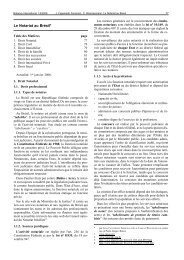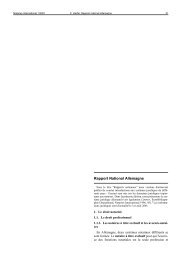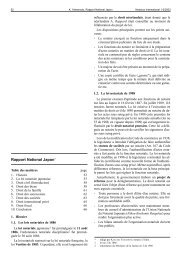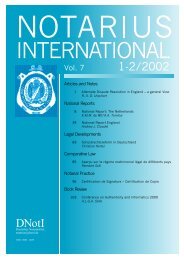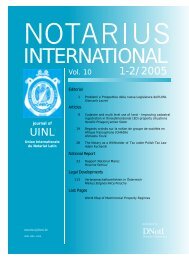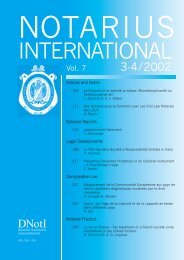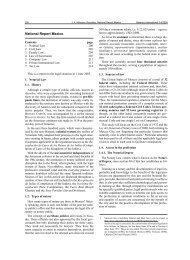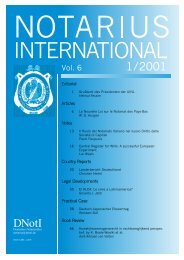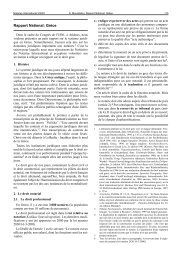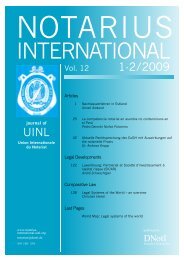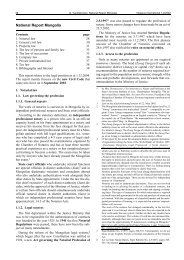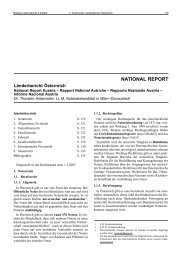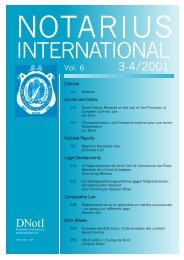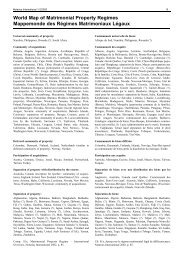You also want an ePaper? Increase the reach of your titles
YUMPU automatically turns print PDFs into web optimized ePapers that Google loves.
<strong>Notarius</strong> <strong>International</strong> 3-4/<strong>2005</strong> R. Rivas Andrés, Poderes Extranjeros en España 293<br />
PRACTICAL CASE<br />
Notas sobre la Recepción en España de Poderes Extranjeros no formalizados<br />
en Escritura Pública<br />
Recognition of foreign powers of attorney in Spain<br />
La reconnaissance de procurations étrangères en Espagne<br />
Anerkennung ausländischer Vollmachten in Spanien<br />
Il riconoscimento di procure straniere in Spagna<br />
RAFAEL RIVAS ANDRÉS, Notario en Alcalà de Xivert (Castellón), España<br />
página<br />
Artículo en español 294<br />
Summary<br />
Foreign powers of attorney are recognised in Spanish<br />
land registry dealings if they are officially recorded.<br />
But powers of attorney with mere attestation of signature<br />
will also be recognised if they are equivalent to the<br />
Spanish form. This, at any rate, is what RIVAS ANDRÉS infers<br />
from two decisions by the DGRN (Dirección<br />
General de Registros y Notariado – Directorate General<br />
of Registries and Notarial Affairs) of 11.6.1999 and<br />
21.4.2003. According to his analysis of the decisions, the<br />
minimum requirements are the notary's name, the place<br />
and date of attestation, identification of the parties involved,<br />
their legal capacity and a statement to the effect<br />
that they are making the declarations on their own behalf.<br />
In particular the verification of legal capacity does not<br />
have to be expressly declared in the attestation clause but<br />
can also result implicitly from the fact that the notary undertook<br />
the attestation of signature.<br />
To be distinguished from the matter of recognition of<br />
foreign powers of attorney is the issue of recognition of a<br />
foreign deed for transfer of ownership in the Spanish<br />
land register. According to two recent decisions by the<br />
DGRN a foreign notarial recording is not sufficient in<br />
this case; however one of these cases is still on appeal 1 .<br />
Sommaire<br />
Les procurations étrangères sont reconnues en matière<br />
de droit du livre foncier espagnol, si elles font l’objet<br />
d’un acte notarié.<br />
Même les procurations qui font l’objet d’une légalisation<br />
de signature sont reconnues lorsqu’elles sont équivalentes<br />
aux procurations espagnoles quant à leur forme.<br />
C’est au moins la conclusion que tire RIVAS ANDRÉS sur la<br />
base de deux décisions de la DGRN (Dirección General<br />
de Registros y Notariado – Direction générale des registres<br />
et du notariat) du 11 juin 1999 et du 21 avril 2003.<br />
D’après son analyse des décisions, les réquisitions minimales<br />
sont le nom du notaire, la date et le lieu de la légalisation,<br />
l’identification des parties, leur qualité d’auteur<br />
et leur capacité d’exercice. La vérification de la capacité<br />
d’exercice (entre autres) ne doit pas expressément<br />
être indiquée dans la mention de la légalisation. Elle résulte<br />
implicitement du fait de la légalisation de la signature<br />
par le notaire.<br />
Il faut distinguer entre la reconnaissance des procurations<br />
étrangères et la reconnaissance d’actes étrangers<br />
pour l’inscription dans le livre foncier espagnol. Dans<br />
ce dernier cas, l’authentification sur la base du droit<br />
étranger n’est pas suffisante conformément à deux décisions<br />
plus récentes de la DGRN. Cependant, l'une des décisions<br />
fait encore l'objet d'un recours. 2<br />
Zusammenfassung<br />
Ausländische Vollmachten werden im spanischen<br />
Grundbuchverkehr anerkannt, wenn sie beurkundet<br />
sind.<br />
Aber auch Vollmachten mit bloßer<br />
Unterschriftsbeglaubigung werden anerkannt, wenn sie<br />
der spanischen Form gleichwertig sind. Dies entnimmt<br />
RIVAS ANDRÉS jedenfalls zwei Entscheidungen der<br />
DGRN (Dirección General de Registros y Notariado –<br />
Generaldirektion für die staatlichen Register und das<br />
Notariat) vom 11.6.1999 und vom 21.4.2003.<br />
Minimalerfordernisse sind nach seiner Analyse der<br />
Entscheidungen die Bezeichnung des Notars, von Ort<br />
und Datum der Beglaubigung, die Identifikation der<br />
Beteiligten, deren Autorenschaft und Geschäftsfähigkeit.<br />
Insbesondere die Prüfung der Geschäftsfähigkeit muss<br />
nicht ausdrücklich im Beglaubigungsvermerk festgestellt<br />
werden, sondern kann sich auch implizit daraus ergeben,<br />
dass der Notar die Unterschriftsbeglaubigung vorgenommen<br />
hat.<br />
Von der Anerkennung ausländischer Vollmachten zu<br />
unterscheiden ist die Frage der Anerkennung einer ausländischen<br />
Urkunde für die Eigentumsumschreibung<br />
im spanischen Grundbuch. Hier genügt nach zwei neue-<br />
1 Dirección General de Registros y Notariado – DGRN, decisions of<br />
February 1st <strong>2005</strong> and of May 23rd <strong>2005</strong>, OJ Spain (BOE) No.<br />
182/<strong>2005</strong> of 1st of August <strong>2005</strong>, p. 27155, No. 13241. The first decision<br />
has been overturned by a judgement of the 6th Chamber of the<br />
Court of Tenerifa; the appeal against this judgement is still pending.<br />
2 Direction Générale des registres et du Notariat (DGRN), décisions du<br />
1 er février <strong>2005</strong> et du 23 mai <strong>2005</strong>, JO Espagne (BOE) n o 182/<strong>2005</strong><br />
du 1 er août <strong>2005</strong>, p. 27155, n o 13241. La première décision a été abrogée<br />
par la 6 e chambre du tribunal de Ténériffe; quant au recours, la<br />
décision n'a pas encore été prise.



